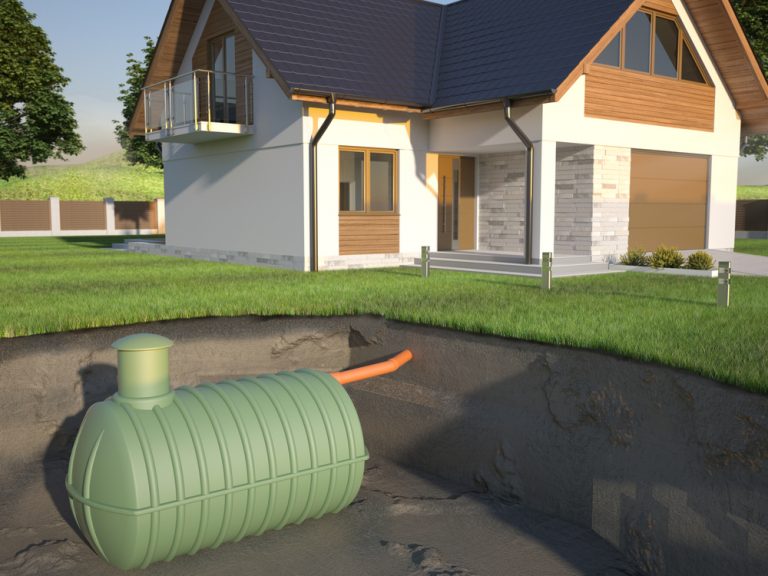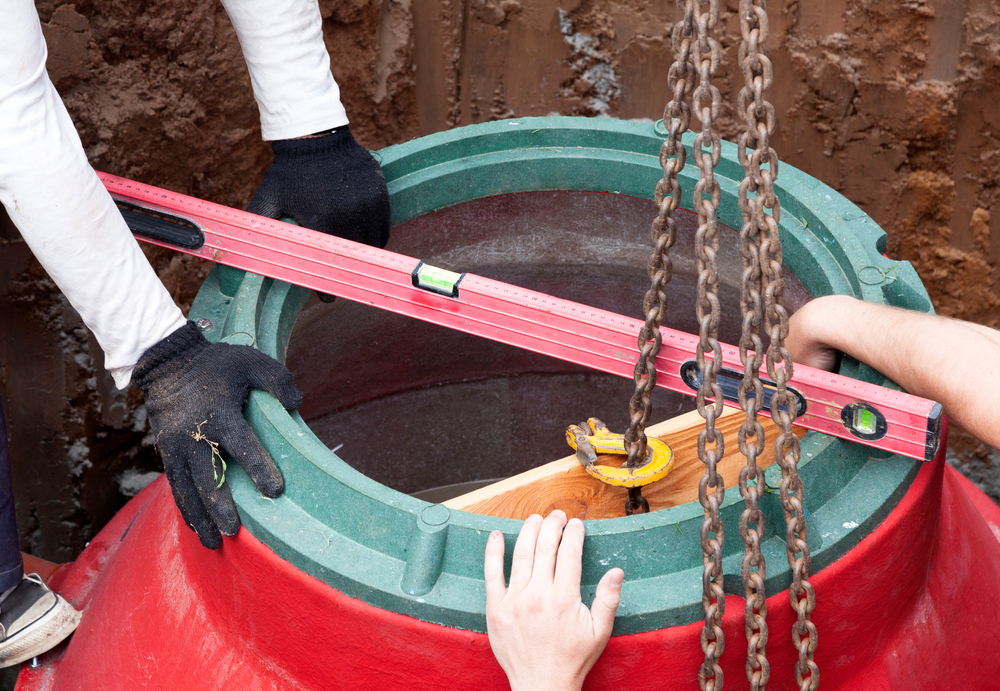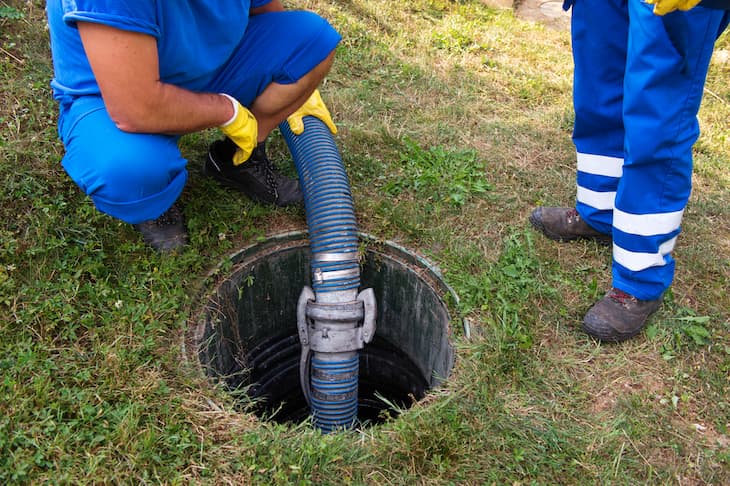Whether you are building a new home in Alberta and installing a new septic system or are interested in learning more about maintaining your current septic system, you’ve come to the right place!
Understanding how septic systems work is essential when it comes to properly maintain your system to prolong its life and avoid costly repair bills.
Just keep in mind that many septic system repairs are not a DIY affair. To repair a septic system, you will need the knowledge and expertise of a plumbing specialist.
Overall, it’s important to not let small problems become larger issues!
Here is everything you need to know about septic systems in Alberta:
How Septic Systems Work
A septic system contains components that work together to ensure your household waste is properly stored and disposed of.
These components include:
- Septic Tank: This rectangular or cylindrical tank is made of concrete, fiberglass, or polyethylene. It’s buried underground and collects waste from your home.
- Drain Field: Sewage from the septic tank is drained through drain field pipes to the drain field.
- Pump Tanks: Pumps are not necessary for your septic system but are recommended. Effluent pumps, control floats, and high-water alarms ensure the proper operation and maintenance of your system.
- Distribution Box: Located between the septic tank and the drain field, the distribution box evenly distributes water equally between the drain field lines.
- Leach Drain Field: This component receives the effluent from the septic tank and distributes waste into the soil.
So how do septic systems work?
Septic systems work by using naturally occurring bacteria to break down household waste into three categories:
- Sludge refers to heavy materials (solid food wastes, feces, toilet paper, etc.) that settle on the bottom of the tank.
- Scum is made of lighter materials (soap, oil, and grease) that float to the surface of the tank.
- Effluent wastewater is the remaining liquid that sits in the middle of the tank and is moved to the drain field.
All the waste deposited into septic tank systems eventually becomes effluent wastewater and exits the tank into the drain field.
How Much Do Septic Systems Cost?
Septic system costs can vary significantly depending on different factors, such as the type of septic tank and the material it is made out of as well as the size of your home.
In order to determine septic system costs, it’s important to determine what type of septic system is best suited for your home:
Septic Tank Types
There are different types of septic tanks you can choose from, such as:
- Anaerobic Septic System: This common choice does not require additional power or chemicals and contains a type of bacteria that does not require oxygen to break down waste. The average cost is $2,000 to $5,000.
- Gravity Septic System: These systems use gravity to control water flow instead of pumps. The average cost is $1,500 to $4,000 but must be installed on a gentle slope.
- Conventional Septic System: This system includes a tank and trench that acts as a drain field but requires a large space. The average cost is $2,000 to $5,000.
- Chamber Septic System: Chamber septic systems are similar to conventional ones except plastic chambers are used instead of gravel in the drain field. The average cost is $1,500 to $5,000.
- Aerobic Septic System: Aerobic septic systems use bacteria that require oxygen that is pumped into the tank. This tank is best suited for unfavorable soil and high groundwater tables. The average cost is $10,000 to $20,000.
- Mound Septic System: For homes with groundwater close to the surface, mound septic systems are recommended. The average cost is $10,000 to $20,000.
Septic Tank Materials
The material your septic tank is made of can also influence the cost.
For example, concrete tanks are made of a durable material that can last you for years and cost around $750 to $2,000.
You can also get a plastic tank that is lightweight, durable, and easy to install for around $850 to $1,400.
Lastly, you can choose a durable fiberglass tank that does not attract algae growth for $1,600 to $2,000.
Septic Tank Size
You need to be sure that the size of your septic tank can accommodate the size of your home.
This is typically determined by how many bedrooms you have since the number of people in your home can will affect how much water will flow through the system each day.
Two-bedroom homes typically require a 750-gallon tank, three-bedroom homes require a 1000-gallon tank, and four-bedroom homes require a 1,250-gallon tank.
Installation
Lastly, you need to factor in installation costs. Installation of septic tanks in Alberta generally involves the following average costs:
- Soil Test: $1,000 to $2,000
- System Design: $600
- Land Cleaning: $950
- Installation and Connection: $1,000 to $1,500
- Drain Field: $3,000 to $15,000
- Inspection and Testing: $250 to $450
How Long Do Septic Systems Last?
A septic system should last you from 15 to 40 years. However, how long your septic tank system lasts depends on the material is it made of as well as proper maintenance.
To extend the life of your septic system, here are some maintenance tips:
- Be careful what goes down your drains and don’t treat your toilet like a trash can! Non-decomposable materials, such as cooking grease, paper towel, and baby wipes, can clog and damage the system.
- Avoid disposing of chemicals, phosphates, and non-biodegradable substances in your septic tank. This can disrupt the bacteria necessary to break down your household waste.
- Reduce your water usage by conserving water in your home to reduce the risk of septic system failure. Try having shorter showers or spreading your washing machine and dishwasher usage throughout the week.
- Be mindful of the appliances you use in your home that rely on water. The more appliances you use, the less efficient your system will be.
- Maintain your drain field by avoiding planting trees and gardens on or around your drain field. The roots can grow into the pipes and cause damage to the plumbing.
- Avoid parking vehicles or building structures on top of your drain field. This will cause the soil to compact and prevent the drain field from working properly.
- Keep extraneous water from accessing the drain field by ensuring gutters and sump pumps empty far away from this area.
To increase the lifespan of your septic tank system, you should have it pumped by a professional every three years to avoid scum and sludge levels from getting too high and causing a blockage.
Are Septic Systems Good for Alberta’s Climate?
While Alberta is known for experiencing frigid winter months, there is no reason to believe that your septic system can’t handle subzero temperatures.
However, preventative measures and maintenance should be carried out to ensure that your acreage septic system in Alberta works during the wintertime.
Once the temperatures drop below zero, here are some ways you can prevent issues with your septic system:
Avoid Compacted Snow
Snow makes for great pipe insulation during the wintertime but if it is compacted on or around your septic tank, this may cause issues.
When the soil over your septic system becomes compacted, there is no space for water and air to circulate within your tank. The microorganisms in the septic tank require water and air in order to thrive.
Plus, compacted snow can cause frost to sink deeper into the soil and freeze the tank.
Add Insulation to Your Septic System
If there is not enough snow to provide insulation for your system, you can add straw, hay, leaves, or mulch to prevent your septic tank and lines from freezing.
You can also have a qualified professional add insulation materials to exterior pipes.
Fix Leaky Toilets and Faucets
Continuous leaks in your home during the wintertime can cause issues with your septic tank system. Leaks allow water to access the system which can make it difficult for bacteria to replenish.
Without enough bacteria in the septic tank to break down waste, there may not be enough heat generated to prevent freezing.
How Not to Maintain Your Septic System in the Winter
With so much “advice” out there concerning winter maintenance for your septic system, here are some tips you should definitely avoid:
- Never add antifreeze or salt to your system because this can negatively impact the natural bacteria inside your tank.
- Do not continually run water from your taps to thaw your septic system.
- Do not pour hot water down your drains to thaw your pipes. If there is a blockage, this could cause your pipes to explode!
The only safe way to thaw out frozen plumbing is to gently heat the section of pipe that is frozen if you can safely access it.
Otherwise, it is recommended you contact a professional to help you fix your septic system during the winter.
Common Septic Tank Problems & How to Solve Them
Even though septic systems are well-designed and durable, there is always the potential for malfunction and damage.
Again, keep in mind that many septic tank problems need to be addressed by a professional septic technician. They have the expertise to inspect your septic system and advise you on repair measures!
Otherwise, here are some common septic tank issues and how to solve them:
Sewage Backup
If you notice water or smelly black liquid coming from your drains, you likely are experiencing a sewage backup. This means that your septic tank or drain field is too full or there is a blockage.
You can prevent this issue by reducing your water usage and being mindful of the substances you flush down your drains.
How to Fix: If your sewage backup is caused by a clogged septic line, you can try to fix this by using a plumbing snake or plunger to clear the blockage. Otherwise, you will have to call in the professionals.
Slow Drainage
Slow drainage can also indicate a blockage or clog in your system. This generally occurs in the pipe leading to your septic tank.
How to Fix: Stick to natural products that contain bacteria and enzymes to unclog your pipes. This will also help break down waste in your septic tank.
Greener Grass Around the Septic Tank
Having lush, green grass around your septic tank is a sign that sewage may be seeping from the tank into your yard before it has a chance to reach the drain field.
How to Fix: Contact a professional to inspect your septic system for leaks and cracks. It may also be time to have your tank pumped out.
Pooling Water in Your Yard
Heavy rainfall can prevent your septic tank from properly draining and result in pools of water in your yard. However, this can also be caused by a septic line leak.
How to Fix: In the case of heavy rainfall, wait to see if your septic system catches up with draining the excess water. Otherwise, you will have to have your system inspected by a septic system technician.
Pungent Smells
When you notice pungent smells of septic gas, this can indicate numerous issues such as a dried-out toilet wax seal, a dry trap in the floor drain, or a leak in your septic line.
How to Fix: Check your interior fixtures to rule out issues inside your home. If the issue is exterior, call in a professional.
Professional Septic System Service in Alberta
From big to small, Peak Sewer covers it all!
Our expert team of septic technicians offers quality and professional service at an affordable price – whether you are looking to install a new septic system, have one maintained, or are in need of repair or replacement.
We also provide 24/7 drain cleaning services so you don’t have to put your life on hold waiting for a repair!
Get in touch with us today to see how Peak Sewer can help you with your septic system needs.



